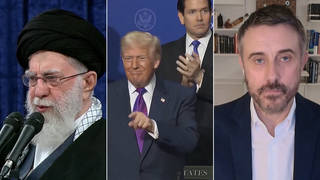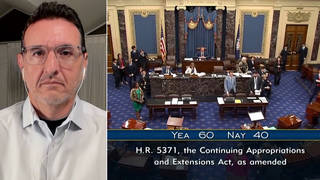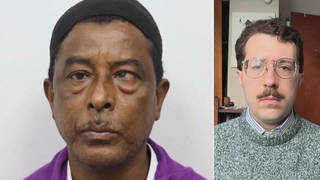
Guests
- Steffie Woolhandlerphysician and distinguished professor of public health at Hunter College-CUNY.
The central fight in the U.S. federal government shutdown has been over healthcare costs, with Democrats demanding that Republicans agree to extend subsidies for the Affordable Care Act set to expire this Saturday. Without an extension of those subsidies, health premiums could more than double for millions of people across the country. The enhanced subsidies were first put in place during the COVID-19 pandemic.
“The purpose of healthcare has increasingly become profit-making rather than a public service,” says Dr. Steffie Woolhandler, professor of public health at Hunter College and co-founder of Physicians for a National Health Program. She says that while extending the Obamacare subsidies is vital, the United States should move toward universal public healthcare like every other major Western economy “and away from our private, profit-oriented healthcare system.”
Transcript
AMY GOODMAN: This is Democracy Now!, democracynow.org. I’m Amy Goodman, with Juan González.
As the U.S. federal government shutdown enters its 28th day, we now look at how Democrats are demanding Republicans agree to extend healthcare subsidies from the Affordable Care Act that are set to expire Saturday, if Republicans want the votes to end the shutdown. Health insurance premiums are expected to more than double for some 20 million people, unless Congress acts. Many have already faced sticker shock when they received letters about their new premiums. The enhanced subsidies were first put in place during the pandemic.
For more, we’re joined here in New York by Dr. Steffie Woolhandler, distinguished professor of public health at Hunter College-CUNY, co-founder of Physicians for a National Health Program, contributes regularly to top medical journals, co-authored the latest report, just out in Lancet, headlined “Health care in the USA: money has become the mission.”
Welcome back to Democracy Now!, Dr. Woolhandler. Explain what you mean, “money has become the mission.” Exactly what is happening, what the Republicans are refusing to do right now, to reopen the government, because the Democrats are saying they won’t vote for an end to the shutdown until these tax subsidies are extended?
DR. STEFFIE WOOLHANDLER: OK. Well, the purpose of healthcare has increasingly become profit-making rather than a public service. Specifically, Congress and Trump have refused to extend the tax credits, which will double the premiums for 20 million Americans who get their coverage through the Affordable Care Act. That’s the line in the sand that the Democrats have drawn on the shutdown.
But the bigger issues include that the One Big Beautiful Bill, that Trump signed into law on July 4th, is going to cut $1 trillion out of the Medicaid program, which more than one in every five Americans rely on to make their healthcare affordable. Additionally, Trump has been giving giveaways to the private insurance industries — private insurance companies that have taken over the Medicare Advantage program. He doubled their pay increase this year, even though we already know that they’re being overpaid by about $80 billion a year because a congressional — official congressional Medicare Payment Advisory Commission says they’re being overpaid $80 billion. Nonetheless, Trump doubled their pay increase, meaning that prices will go up for the taxpayers and will go up for Medicare beneficiaries.
So, there’s many things that Trump is doing, the Republican Congress is doing, to accelerate price increases and favor the for-profit provision of healthcare, rather than thinking about healthcare as the public service.
JUAN GONZÁLEZ: And, Steffie Woolhandler, these cuts will affect not just Medicaid, but also many people who are in — let’s say, small business owners or the self-employed. Could you talk about that sector of the population that will be affected?
DR. STEFFIE WOOLHANDLER: Well, many people are going to be affected by cuts in various ways. But the refusal to extend the subsidies, which is what we’re talking about with the shutdown, that affects small businesses. It affects near-poor people, middle-income people the most. The Medicaid cuts affect everybody, too. That’s not just the poorest of the poor. Medicaid actually provides subsidies to many people on Medicare to reduce the price of their medications. Medicaid is a major source of funding for most rural hospitals. Many community hospitals get a big chunk of their funding from Medicaid. So, when that Medicaid funding is cut, it’s going to be hard for community hospitals to pay their bills, and that will affect the healthcare quality for everyone. So, the Trump administration and Congress are cutting in many, many ways.
JUAN GONZÁLEZ: And you were mentioning also Medicare Advantage. We’re in this period now when literally, on television, cable, social media, all of these Medicare Advantage companies are constantly, constantly, every single day, advertising to seniors. It’s an enormous amount of expenditure just to create more market share for each of these companies. Why do we even need to go through all of this every year?
DR. STEFFIE WOOLHANDLER: OK. Well, you’re correct. The Medicare Advantage program is a giant waste of money. It’s raised the cost to the taxpayers by $80 billion last year alone, by over $600 billion over the past 20 years or so. And yet the Trump administration is further encouraging it. It also raises cost to Medicare beneficiaries through the Part B premiums. It pushes them up. So, we should have never turned over the Medicare program to these private, profit-seeking insurance companies, like UnitedHealthcare. It was a giant mistake, and we should be trying to reverse that mistake now, rather than encouraging it, as the Trump administration is doing.
AMY GOODMAN: Dr. Woolhandler, put this in a global context. In the industrialized world, where does the U.S. stand? I mean, in this country, I think people, overall, believe in public education. I mean, you can go to a private school if you have the money, but that everyone should be able to get an education in this country. Why does that not extend to healthcare? And explain how we compare to Canada, who Trump is punishing right now, to Britain. I mean, you are the co-founder of Physicians for a National Health Program. And how do you see us getting there from here?
DR. STEFFIE WOOLHANDLER: OK. Well, every other developed nation has some form of national health insurance or national health service. When we compare the United States to those other nations, we find that healthcare costs are more than 50% higher in the U.S. than they are in other nations. When we look at outcomes like life expectancy, we find that Americans live four years shorter than people in other countries. We’re dying four years younger than people in Canada or France or Holland. So the national health programs have been much more effective both in guaranteeing universal access, making healthcare affordable, and also at controlling costs. So, we really need to be moving in that direction and away from our private, profit-oriented healthcare system.
AMY GOODMAN: And how do you see us getting there from here?
DR. STEFFIE WOOLHANDLER: Well, there have been major movements for single-payer Medicare for All over time, that the issue of healthcare affordability and access is not going away. And I think that is the vision that Senator Sanders and many others have put forward about where we need to be going. And that is what we need to be doing, is keeping our eye on the prize, creating an alternative vision to what Trump is offering right now.
AMY GOODMAN: Dr. Steffie Woolhandler, physician, distinguished professor of public health at Hunter College-CUNY, City University of New York, co-founder of Physicians for a National Health Program. We’ll link to your latest report in Lancet, “Health care in the USA: money has become the mission.”
Coming up, David Sirota of The Lever on Master Plan: The Hidden Plot to Legalize Corruption in America. Stay with us.
[break]
AMY GOODMAN: “Christmas in Washington” by Steve Earle, here in our Democracy Now! studio.













Media Options